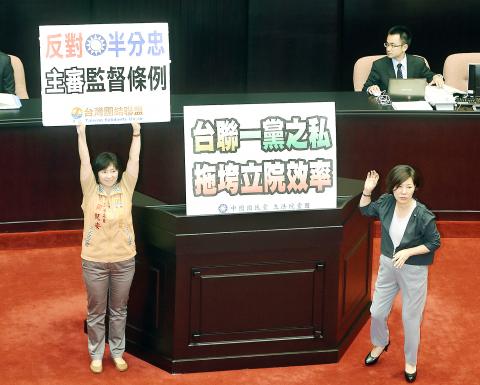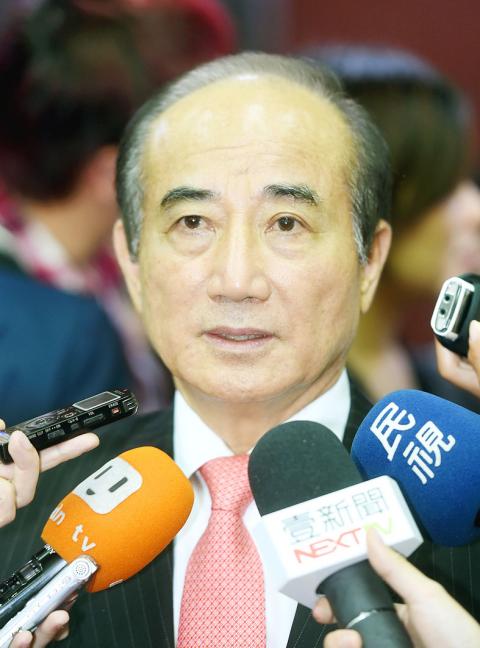Legislative Speaker Wang Jin-pyng (王金平) yesterday said that nothing would be “nonnegotiable” between Taiwan and China once certain conditions are met.
Wang made the remarks at a news conference about a Taiwanese film company’s documentary on a father-son pair of Qing Dynasty artist-officials, Dong Bangda (董邦達) and Dong Gao (董誥).
Chinese culture is what connects the two sides of the Taiwan Strait, Wang said, calling for more cultural exchanges, creating more consensuses and increased collaboration.

Photo: Fang Pin-Chao Taipei Times
“When one day the political systems of the two sides are compatible, the GDP per capita comparable, the social and public values similar, and religious freedom guaranteed, the heart of the two sides of the Strait could be melded together and nothing would be nonnegotiable then,” the speaker said.
Meanwhile, asked if he would run in next year’s presidential election for the Chinese Nationalist Party (KMT) or instead run for legislative office in Changhua County as has been rumored, Wang called the rumor “nonsense,” but refused to give a definitive answer about the presidential race.
He said a conclusion “would surely be out before May 16,” the deadline for picking up a KMT presidential primary application.

Photo: Fang Pin-Chao, Taipei Times
In related news, the Taiwan Solidarity Union (TSU) caucus stalled the legislature with 200 agenda-changing motions in a bid to derail a KMT plan related to draft bills for an oversight mechanism for cross-strait agreements.
The KMT reportedly aims to pass a reconsideration motion of referring the bills to the Internal Administration Committee for review.
If the reconsideration had been put to a floor vote yesterday as the KMT caucus had planned, it likely would have been passed, given the KMT’s legislative majority.
The party could then have had the committee’s convener, KMT Legislator Chang Ching-chung (張慶忠), preside over the review of the oversight bills.
Chang helped trigger the Sunflower movement in March last year by ramming the cross-strait service trade agreement through the committee and to the legislative floor in just 30 seconds.
The TSU launched its stalling campaign after cross-party negotiations broke down in the morning.
KMT deputy caucus whip Liao Kuo-tung (廖國棟) said the KMT conceded by allowing KMT Legislator Chiu Wen-yen (邱文彥) to chair the review instead of Chang.
However, TSU lawmakers said there should be a review without the KMT playing a presiding role in the committee.
They then proposed 200 motions to change the legislative agenda.
Each motion requires at least a few minutes to be put to a floor vote. When the floor meeting adjourned at about 4pm, only 61 of the motions had been voted upon.

Auckland rang in 2026 with a downtown fireworks display launched from New Zealand’s tallest structure, Sky Tower, making it the first major city to greet the new year at a celebration dampened by rain, while crowds in Taipei braved the elements to watch Taipei 101’s display. South Pacific countries are the first to bid farewell to 2025. Clocks struck midnight in Auckland, with a population of 1.7 million, 18 hours before the famous ball was to drop in New York’s Times Square. The five-minute display involved 3,500 fireworks launched from the 240m Sky Tower. Smaller community events were canceled across New Zealand’s

The Ministry of Foreign Affairs (MOFA) yesterday said it is closely monitoring developments in Venezuela, and would continue to cooperate with democratic allies and work together for regional and global security, stability, and prosperity. The remarks came after the US on Saturday launched a series of airstrikes in Venezuela and kidnapped Venezuelan President Nicolas Maduro, who was later flown to New York along with his wife. The pair face US charges related to drug trafficking and alleged cooperation with gangs designated as terrorist organizations. Maduro has denied the allegations. The ministry said that it is closely monitoring the political and economic situation

UNRELENTING: China attempted cyberattacks on Taiwan’s critical infrastructure 2.63 million times per day last year, up from 1.23 million in 2023, the NSB said China’s cyberarmy has long engaged in cyberattacks against Taiwan’s critical infrastructure, employing diverse and evolving tactics, the National Security Bureau (NSB) said yesterday, adding that cyberattacks on critical energy infrastructure last year increased 10-fold compared with the previous year. The NSB yesterday released a report titled Analysis on China’s Cyber Threats to Taiwan’s Critical Infrastructure in 2025, outlining the number of cyberattacks, major tactics and hacker groups. Taiwan’s national intelligence community identified a large number of cybersecurity incidents last year, the bureau said in a statement. China’s cyberarmy last year launched an average of 2.63 million intrusion attempts per day targeting Taiwan’s critical

‘SLICING METHOD’: In the event of a blockade, the China Coast Guard would intercept Taiwanese ships while its navy would seek to deter foreign intervention China’s military drills around Taiwan this week signaled potential strategies to cut the nation off from energy supplies and foreign military assistance, a US think tank report said. The Chinese People’s Liberation Army (PLA) conducted what it called “Justice Mission 2025” exercises from Monday to Tuesday in five maritime zones and airspace around Taiwan, calling them a warning to “Taiwanese independence” forces. In a report released on Wednesday, the Institute for the Study of War said the exercises effectively simulated blocking shipping routes to major port cities, including Kaohsiung, Keelung and Hualien. Taiwan would be highly vulnerable under such a blockade, because it